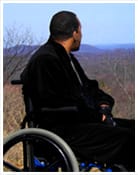Nursing Home Injury Info Center
Nursing Home Injuries – An Overview
Individuals reside at nursing homes or long-term care facilities to ensure that they are well cared for. Patients may be any age; however, most nursing home patients are elderly persons who need assistance with basic care. Nursing homes provide basic necessities such as food, shelter, clothing and medical care. Along with basic necessities, we expect residents to be treated with dignity and respect. Dignity and respect include the right to privacy, communication with loved ones, visitors, control over medical records/decisions and a good quality of life. However, sometimes nursing home residents do not have a good quality of life and are mistreated while in the care of a long-term facility. Mistreatment may be in the form of abuse, neglect or exploitation by a staff member or other individual in the care facility. If your loved one is a patient who has been harmed in a nursing home, contact an experienced and compassionate nursing home attorney at Ellis Law, P.C. in Poughkeepsie, NY, to learn about your legal options.
Over the past decades, the public has been made aware of this growing problem within our society. This has lead to the federal and state legislatures enacting laws to protect nursing home residents. Statutes protect against mental and physical abuse, neglect and exploitation. There are legal options for a victim of nursing home abuse. Legal options include civil actions, breach of contract claims and criminal liability for those guilty of abuse. The types of proceedings have different objectives. A civil action is a claim for monetary damages. Alternatively, criminal prosecution does not compensate the victim of abuse, but punishes the person or persons guilty of committing the harmful conduct. If a care facility is found liable of abuse or knowledge of abuse, there may be sanctions available as well. Sanctions may include stripping the care facility of its license to operate, loss of federal and state Medicaid revenues, preventing a health care provider from participating in the Medicaid program and fines for violations of state and federal protection regulations.
Legislatures have also created nursing home resident rights. If a long-term care facility wants to receive government funding, they must provide these rights. The Patient Bill of Rights may differ from state to state. However, the basic rights include financial, medical, social, safety and administrative rights. Resident rights focus on quality of life, dignity, respect and the ability to make his or her own choices. The intent of state and federal statutory protections is to give patients a voice in their care, an outlet for grievances and protection for those who cannot voice their grievances.
Why Has Nursing Home Resident Abuse Become An Increasing Problem?
There may be multiple reasons for the increase in incidents of abuse in recent years. Some of these reasons may be staffing issues, inaccurate record keeping of incidents, care facilities focus on profit, the growing number of elderly persons in our country and the lack of care for our nation’s elderly or nursing home resident population. The growing demand for nursing home placement is a concern. There is an ever-growing number of potential patients and not enough health-care facilities to meet the demand. Standards fall through the cracks when there is a scramble to meet this need. One standard concerns the staff members in long-term care facilities. Many nursing homes are understaffed and/or staffed by poorly trained employees. The understaffing may be due to the low wage offered employees, high employee turnover or a lack of job satisfaction.
Nursing homes are in the business of care giving, but are still a business. In some cases, care facilities focus more on the business than the patients. There is a focus on profit. Less care and understaffing may lead to higher profits. Although healthcare professionals should be making decisions based on patient care, it is often the corporate accountants who are making the decisions for the company’ the bottom line and not for the resident’s well being. This may also lead to inaccurate records being kept by nursing home facilities. Paper records required by state and federal law may be altered. Often regulatory authorities require written incidents of abuse and altering these records may make reporting numbers inaccurate. This in turn may ensure that facilities continue to receive their state funding, which also helps the bottom line.
Speak To A Personal Injury Lawyer
If your loved one is a patient who has been harmed in a nursing home, contact an experienced and compassionate nursing home attorney at Ellis Law, P.C. in Poughkeepsie, NY to learn about your legal options.
Copyright © 2016 FindLaw, part of Thomson Reuters
DISCLAIMER: This site and any information contained herein are intended for informational purposes only and should not be construed as legal advice. Seek competent legal counsel for advice on any legal matter.

